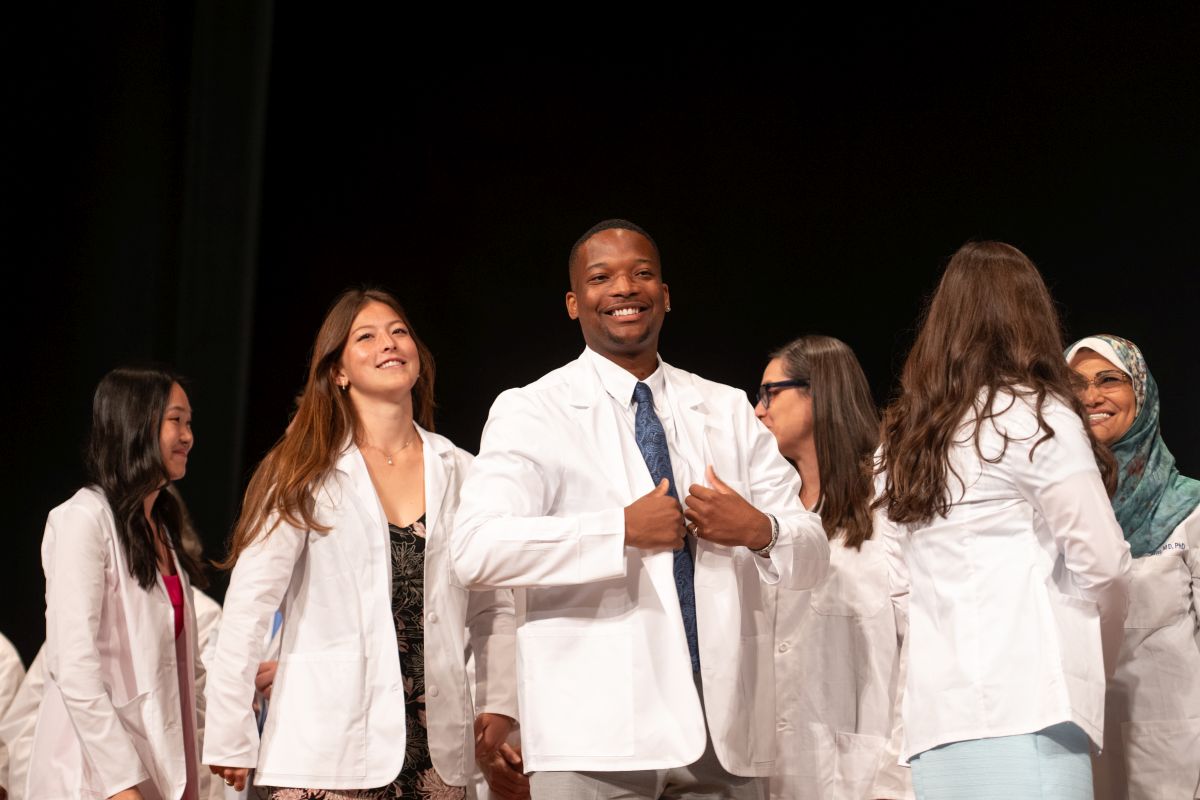MD Program Class of 2029 Celebrates White Coat Ceremony
August 11, 2025
On Friday, August 8, the MD program Class of 2029 gathered at the Academy of Music in Philadelphia for the White Coat Ceremony, a symbolic rite of passage for incoming medical students at Drexel University College of Medicine. This tradition — established in 1993 by the Arnold P. Gold Foundation at the College of Physicians and Surgeons, Columbia University — marks the beginning of a lifelong journey in medicine.
View photos on Facebook | Watch the ceremony on YouTube

When medical students put on their white coats for the first time, they are not only wearing the garment—they are also embracing a profound devotion to professionalism, service and compassion. “The white coat is more than a garment; it is a symbol of trust, accountability and service,” said keynote speaker Linwood R. Haith Jr., MD, professor and academic chair of the Department of Surgery. “To patients, the white coat means hope, someone will listen, care and help.”
Haith also stressed the commitment to lifelong learning that physicians must adhere to. “You must be adaptive learners—curious, critical and collaborative because we only know a fraction of what we will know in 10 years. You will be a student for life,” he said.
The White Coat Ceremony was originally designed to encourage a renewed focus on compassion among future generations of physicians. When donning their white coats, entering students take the Declaration of Geneva’s Physician Pledge — the contemporary successor to the 2,500-year-old Hippocratic Oath — for the first time, affirming their commitment to the professional duties of physicians and the ethical principles of the medical profession.
Walter H. and Leonore Annenberg Dean and Senior Vice President of Medical Affairs Charles B. Cairns, MD, welcomed the Class of 2029 with warmth and pride. “We are gathered to welcome our new medical students into the Drexel University College of Medicine family, and more broadly into the medical profession,” he said. “Today they join generations of clinicians who have paved the way by proudly serving their patients and communities as healers, educators and advocates.”

Cairns emphasized the symbolic weight of the white coat, calling it a “cloak of compassion.” He reminded students that wearing it means accepting the responsibility of caring for every aspect of a patient’s wellbeing. “You must always center your own compassion and humanity, even in the most challenging times,” he said. “They will someday be the bedrock of your practice.”
Leon McCrea II, MD, MPH, Deborah J. Tuttle, MD and John P. Piper, MD Vice Dean for Educational Affairs, reflected on the ceremony’s deeper meaning in his opening remarks. “This ceremony symbolizes our social and societal contract with our communities to serve as healers, and there is no greater calling than to be in service to others, especially in their most vulnerable moments,” he said. “In medicine, nothing happens by accident. The qualities we hope to see as educators — empathy, compassion, integrity — are intrinsic, yet they must be cultivated with intentionality.”
The ceremony also upholds the College of Medicine’s robust legacy, rooted in the pioneering spirit of Hahnemann University and Woman’s Medical College—the first degree-granting medical school for women, which celebrated its 175th anniversary this year. “Those storied institutions, and Drexel’s excellence and rich history, have fundamentally shaped who we are as a college and as a community,” said Cairns. “As we honor our past, we also remain focused on our future. The College of Medicine has continued to grow and innovate,” he said, acknowledging recent graduations, incoming cohorts and new developments.
As the Class of 2029 begins their medical education, the White Coat Ceremony serves as a reminder of the journey ahead. It is a tradition that underscores the value of clinical excellence, ethical practice and service. With the strong foundation of the College of Medicine’s legacy and a commitment to lifelong learning, these students are equipped to take their first steps in shaping the future of health care.